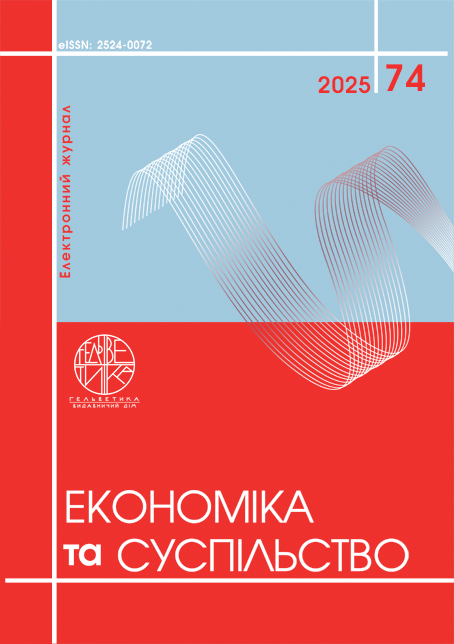ЦИФРОВІ ІНСТРУМЕНТИ ЯК ЗАСІБ РЕАЛІЗАЦІЇ ПІДХОДІВ ДО ДИСТАНЦІЙНОГО ТА ГІБРИДНОГО УПРАВЛІННЯ
Анотація
У статті досліджено роль цифрових інструментів у реалізації підходів до дистанційного та гібридного управління персоналом. Проаналізовано виклики цифрової комунікації, підтримки командної згуртованості, запобігання техностресу та збереження організаційної культури. Розглянуто приклади використання таких платформ, як Microsoft Teams, Trello, Asana, Notion, Slack тощо у контексті комунікації, координації, мотивації та контролю. Узагальнено сучасні підходи до оцінювання результативності у цифровому середовищі. Зроблено акцент на розвитку цифрового лідерства, гнучких моделей управління, підтримці добробуту працівників. Систематизовано відповідність між управлінськими функціями та цифровими рішеннями. Запропоновано стратегічні напрями удосконалення цифрової екосистеми організації, впровадження політик технологічної зрілості та формування нових управлінських компетентностей.
Посилання
Яковенко О. І. Особливості дистанційного управління персоналом в сучасних умовах. Вчені записки ТНУ імені В. І. Вернадського. Серія: Економіка і управління. 2022. № 33(72)1. С. 34-39. URL: https://www.econ.vernadskyjournals.in.ua/journals/2022/33_72_1/8.pdf (дата звернення: 22.05.2025)
Leonardi P. M. COVID-19 and the New Technologies of Organizing: Digital Exhaust, Digital Footprints, and Artificial Intelligence in the Wake of Remote Work. Journal of Management Studies. 2021. № 58(1). P. 249-253. URL: https://pmc.ncbi.nlm.nih.gov/articles/PMC7675341 (дата звернення: 24.05.2025)
Contreras F., Baykal E., Abid G. E-leadership and teleworking in times of COVID-19 and beyond: What we know and where do we go. Frontiers in Psychology. 2020. № 11, 590271. URL: https://www.frontiersin.org/journals/psychology/articles/10.3389/fpsyg.2020.590271 (дата звернення: 25.05.2025)
Battisti E., Alfiero S., Leonidou E. Remote working and digital transformation during the COVID-19 pandemic: Economic–financial impacts and psychological drivers for employees. Journal of Business Research. 2022. № 150. P. 38–50. URL: https://pmc.ncbi.nlm.nih.gov/articles/PMC9186428 (дата звернення: 25.05.2025)
Hu X. E., Hinds R., Valentine M. A., Bernstein M. S. A «Distance Matters» paradox: Facilitating intra-team collaboration can harm inter-team collaboration. Proceedings of the ACM on Human-Computer Interaction. 2022. № 6(CSCW1), Art.48. URL: https://researchgate.net/publication/358422996 (дата звернення: 24.05.2025)
Bloom N., Han R., Liang J. Hybrid working from home improves retention without damaging performance. Nature. 2024. № 630. P. 920-925. URL: https://www.nature.com/articles/s41586-024-07500-2 (дата звернення: 22.05.2025)
Tawalbeh J. Remote and hybrid work models: Enhancing employee engagement and redefining performance management in a new era. Journal of Posthumanism. 2025. № 5(3). P. 101-116. URL: https://www.researchgate.net/publication/390655474 (дата звернення: 24.05.2025)
Schildt H., Krzywdzinski M. Digitalisation and the transformation of work: The European perspective. European Journal of Industrial Relations. 2023. № 29(1). P. 7–25. DOI: https://doi.org/10.1177/09596801231152035 (дата звернення: 25.05.2025)
Gallup. State of the Global Workplace: 2022 Report. URL: https://www.gallup.com/workplace/349484/state-of-the-global-workplace.aspx (дата звернення: 27.05.2025)
Yakovenko, O. I. Osoblyvosti dystanciinoho upravlinnia personalom v suchasnykh umovakh [Features of remote personnel management in modern conditions]. Vcheni Zapysky TNU imeni V. I. Vernadskoho. Seriya: Ekonomika i upravlinnya. 2022. № 33(72)1. P. 34-39. URL: https://www.econ.vernadskyjournals.in.ua/journals/2022/33_72_1/8.pdf (accessed May 22, 2025) (in Ukrainian)
Leonardi, P. M. COVID-19 and the new technologies of organizing: Digital exhaust, digital footprints, and artificial intelligence in the wake of remote work. Journal of Management Studies. 2021. № 58(1). P. 249-253. URL: https://pmc.ncbi.nlm.nih.gov/articles/PMC7675341 (accessed May 24, 2025)
Contreras, F., Baykal, E., & Abid, G. E-leadership and teleworking in times of COVID-19 and beyond: What we know and where do we go. Frontiers in Psychology. 2020. № 11, 590271. URL: https://www.frontiersin.org/journals/psychology/articles/10.3389/fpsyg.2020.590271 (accessed May 25, 2025)
Battisti, E., Alfiero, S., & Leonidou, E. Remote working and digital transformation during the COVID-19 pandemic: Economic–financial impacts and psychological drivers for employees. Journal of Business Research. 2022. № 150. P. 38–50. URL: https://pmc.ncbi.nlm.nih.gov/articles/PMC9186428 (accessed May 25, 2025)
Hu, X. E., Hinds, R., Valentine, M. A., & Bernstein, M. S. A «Distance Matters» paradox: Facilitating intra-team collaboration can harm inter-team collaboration. Proceedings of the ACM on Human-Computer Interaction. 2022. № 6(CSCW1), Art.48. URL: https://researchgate.net/publication/358422996 (accessed May 24, 2025)
Bloom, N., Han, R., & Liang, J. Hybrid working from home improves retention without damaging performance. Nature. 2024. № 630. P. 920-925. URL: https://www.nature.com/articles/s41586-024-07500-2 (accessed May 22, 2025)
Tawalbeh, J. Remote and hybrid work models: Enhancing employee engagement and redefining performance management in a new era. Journal of Posthumanism. 2025. № 5(3). P. 101-116. URL: https://www.researchgate.net/publication/390655474 (accessed May 24, 2025)
Schildt H., Krzywdzinski M. Digitalisation and the transformation of work: The European perspective. European Journal of Industrial Relations. 2023. № 29(1). P. 7–25. DOI: https://doi.org/10.1177/09596801231152035 (accessed May 25, 2025)
Gallup. State of the Global Workplace: 2022 Report. URL: https://www.gallup.com/workplace/349484/state-of-the-global-workplace.aspx (accessed May 27, 2025)

Ця робота ліцензується відповідно до Creative Commons Attribution 4.0 International License.


